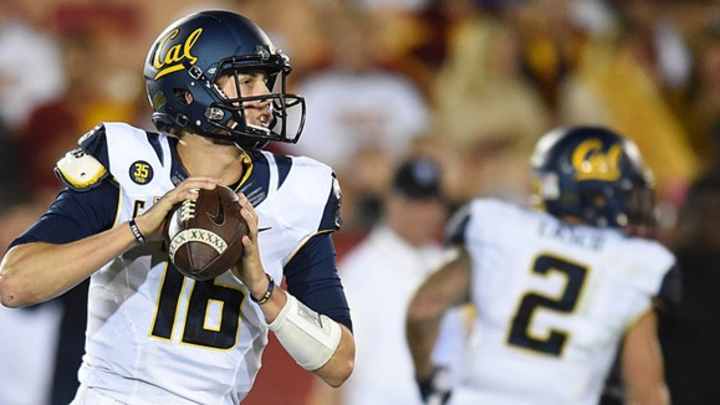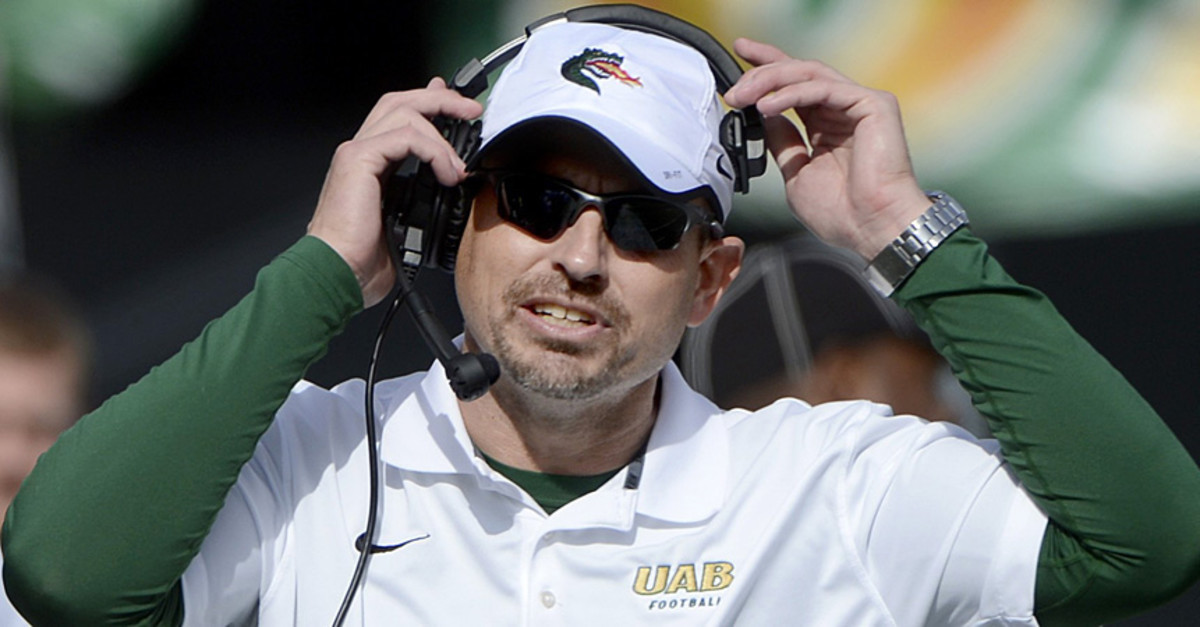Quarterback Jared Goff has things cooking for Cal; UAB's Bill Clark focused on relaunch

For Jared Goff to be better on the field, the Cal quarterback knew he had to improve a major weakness off it. So as important as it was for him to work on his throws, footwork and study of defensive schemes during the off-season, he also had to learn to cook for himself. He relied on his culinary skills to stick to a 5,000 calories-a-day diet that’s helped him pack on 15 pounds since December.
“I was terrible,” Goff says of his cooking talents. “I couldn’t make anything.”
Now, Goff knows how to scramble and fry eggs, which he sometimes uses for sandwiches. He’s also added grilled sausage, hamburgers and hot dogs to his culinary repertoire.
The 6' 4", 215-pound Goff is hardly Emeril Lagasse, but the potential first quarterback to be selected in next April’s NFL draft is proud of his progress. He’s also hopeful that all of his dietary dedication will pay off when he leads the Golden Bears (2–0) and their high-flying, up-tempo spread offense at Texas (1–1) on Saturday night in what will be a defining game for both teams.
“I’m faster now and stronger,” Goff says. “I feel a lot more confident in my arm.”
That strength and confidence has enabled the junior to throw for more than 300 yards in each of unranked Cal’s blowout victories this season. (He’s averaging 315.0 yards per game, with six touchdowns and two interceptions.) Earlier this week, Longhorns defensive coordinator Vance Bedford compared Goff to former Golden Bears signal-caller Aaron Rodgers.
Goff grew up watching Rodgers at Cal and idolizes the Green Bay Packers star, whom he has never met. He’s already passed Rodgers in several categories in the Golden Bears record book, and is just 15 passing yards shy of breaking the school’s career passing yards mark of 8,126, held by Troy Taylor.
But Goff, who hails from nearby Novato, Calif., is well aware that many view him as merely a product of third-year coach Sonny Dykes’s pass-heavy offense. As a sophomore last season, Goff threw for 3,973 yards and 35 touchdowns, with just seven interceptions, as Cal went 5–7. “I really don’t care what people say about our offense or about me,” Goff says.
Last spring, Goff was given more creative license at the line of scrimmage by Golden Bears offensive coordinator and quarterbacks coach Tony Franklin. Now, Goff can make changes to pass protections, receiver routes and even his running backs.
“I’ve become comfortable with that because of my experience in the offense,” he says. Experience has also helped Goff become comfortable with his daily 5,000-calorie diet. In addition to eggs for breakfast as well as hearty meals at lunch and dinner, he snacks on protein shakes and bars.
Greek yogurt has also become one of Goff’s favorites. He also usually eats Alfredo pasta with chicken and bacon before going to sleep.
“It kind of gets to the point where it’s almost like an obsession,” Goff says of his diet. “It’s the same thing I’d say as like people trying to lose weight. It’s the same idea except reversed. I’m trying not to overdo it with that stuff.”
It’s all part of Goff’s lifelong battle against what he calls his ‘superfast” metabolism. When Goff arrived in Berkeley in 2013, he weighed just 185 pounds. He added 15 pounds his sophomore year and could feel a positive difference with his throws and when defenders tackled him.
The most recent 15 pounds he’s added has had the same type of impact. “I like where I’m at right now,” Goff says. “I feel good.”
Goff is also more confident off the field these days. He’s more comfortable with his fame, but still doesn’t like being singled out from his teammates. Cal won’t let Goff answer questions about whether he will leave early for the NFL draft after this season. He’s also quick to dismiss any talk about him being a contender for the Heisman Trophy.
“I don’t think that’s necessary yet,” Goff says.
But he has come to enjoy meeting Golden Bears fans, and often takes photos with them. A year ago, the attention surprised Goff.
Now, he’s used to being recognized during his late-night trips to Gypsy’s Trattoria Italiana for pasta. He laughs recalling how video of him snagging a ground-rule double at a San Francisco Giants game in May generated Internet buzz.
“I’ve kind of become cool with it,” Goff says.
Goff is still trying to hone his culinary skills. He’s thought about maybe even taking cooking classes eventually. His goal is to someday be able to make a handmade gourmet pasta dish with Alfredo sauce and seafood.
“That’d probably be the best thing,” Goff says.
But Cal fans have a list of wins they’d like him to cook up first.

AL.com/Landov
UAB coach Bill Clark on program’s revival, why he stayed, more
The Inside Read:In November, Alabama-Birmingham shuttered its football program. Now this week, you signed a new five-year contract after the school announced in June that it was being reinstated. How emotional have the last 10 months been?
Bill Clark: Really emotional. Just to see these people fight, from community to students, and then rally together. To have something taken away and then to get it brought back, it’s special, real special, because you just feel like you’re doing it for these folks that just fought so hard.
TIR:You’re supposed to have UAB back playing football in 2017. What’s your general plan for that?
BC: I’ve said it many times, that if I was a good recruiter, I’ve got to be a great recruiter. I’ve got to sell 85 guys to get in here, along with walk-ons. We’ve got to build some facilities. The good news is that my administration, everybody in the community’s saying it, but we already had a really good school—got a top 150 school in the world and a great community. Now we need the facilities to back it up. That’s got to happen as we go get these players.
TIR:UAB was bowl-eligible in your first season last year with a 6–6 record, but didn’t get chosen for a bowl. If there hadn’t been so much uncertainty around about the program’s future then, would your team have made a bowl?
BC: I really think so, especially with the fact that the last two games we played, I thought we were playing our best football. We had a great game with Marshall, they were undefeated at the time, and almost beat them. Then we played really well against Southern Miss to get bowl-eligible. I thought we were a really good story, especially where we came from.
TIR:You and your three full-time assistants along with some off-field staffers have already resumed recruiting efforts. What’s the response been so far?
BC: The response has been terrific. Obviously, people have their own towns they pull for, but I think we’ve kind of become a national story and people know us. Our footprint’s really grown across the country. We’ve had a great reception. Everybody’s been terrific.
TIR:There’s been talk of creating a private foundation for UAB athletics like at other universities to help raise additional funding. What are your thoughts on that idea and how would you like to see it operate?
BC: It's critical. I think what that does is that gives people a real sense of where their money’s going. They know what [a] foundation is specific to, whether it’s building facilities or player development. That’s why all these foundations were created at all these top schools. It just gives a way for people to be involved and give. We’ve got so much work to do facility-wise, I think [having a foundation is] going to be critical.
TIR: You turned down assistant coaching jobs and media opportunities well before UAB announced that football was returning. Did you know something everyone else didn’t?
BC: Well, I just had a sense that this had a chance to come back. I won’t be as bold to say that I knew for sure, because I sure didn’t. But I did have a sense that it might. It was a roller coaster because when I would get down, the people and the fight they were having just kept me up, and here we are.
TIR:Many coaches reached out to you after the football program was shut down. Was any of that particularly memorable?
BC: There were so many of them, but I think it was really neat to hear from the guys in my conference—Conference USA—that we competed against. Just telling me the difference they saw on our team from the past without knocking any other UAB teams. Just what they thought about us. All of those guys were memorable.
TIR:You visited some other teams during your hiatus. Where did you go and what did you learn?
BC: We went to Baylor. I think I went to probably every SEC school and went back to Jacksonville State, where I was head coach the year before. I went to see the Philadelphia Eagles. I spoke in clinics all around the country. I also went to South Florida.
TIR:What was the biggest takeaway from your visits?
BC: A lot of it was just reassessing or restrengthening things that I know are true, whether it was tempo or [defensive] things. I just think it’s just good to reaffirm things. It may have been a play here or a technique there. One of the reasons I wanted to go [see] the Eagles was because I think they’re really doing a great job of putting technology and science with their program. That’s one of the things we’ve talked about here with our foundation. UAB’s such a great medical school … and we really need to push that together with nutrition and the study of concussions. We’ve actually got the medical component. We’ve got a research and a medical school. Our medical people are really wanting to get involved with us as we build these new facilities. Hopefully, we can get them something where they’re close. We’re doing concussion testing here. We’re doing all these things that are on the cutting edge. I’d love to be one of those top training centers in the country. Our medical people are all over it. I think that may be something in the near future you see from us.
TIR:What was your conversation with Eagles coach Chip Kelly like?
BC: Really, it was how they do everything just from their GPS trackers, to what they do in the weight room, where they video their guys. A lot of it was ideas that we have. I’m an old strength and speed guy, so I love the training. It’s just like high school where we always had to take what we had and make it better. It’s that mentality, taking what you’ve got and training it to be the best. I’d just love for people to think about us in recruiting for two things: we're getting [the best training] and it’s a super-safe environment, which I think helps our game.
TIR:Chip’s pretty fascinating, right?
BC: I’m telling you, the stuff they’re doing is just cool. Those are the guys that I like to study. Those that have had to take less and do more with it. He was a lower-division guy originally. That’s the people I love talking to because that’s kind of a lot of the situations I’ve been in.
TIR: Let’s be honest, your wife’s gotten tired of having you around so much, hasn’t she?
BC: Yes, that’s why June was such a big deal for her when she was able to get rid of me. I was driving her crazy.
For a daily dose of college football insight, check out The Inside Read every weekday on Campus Rush.
